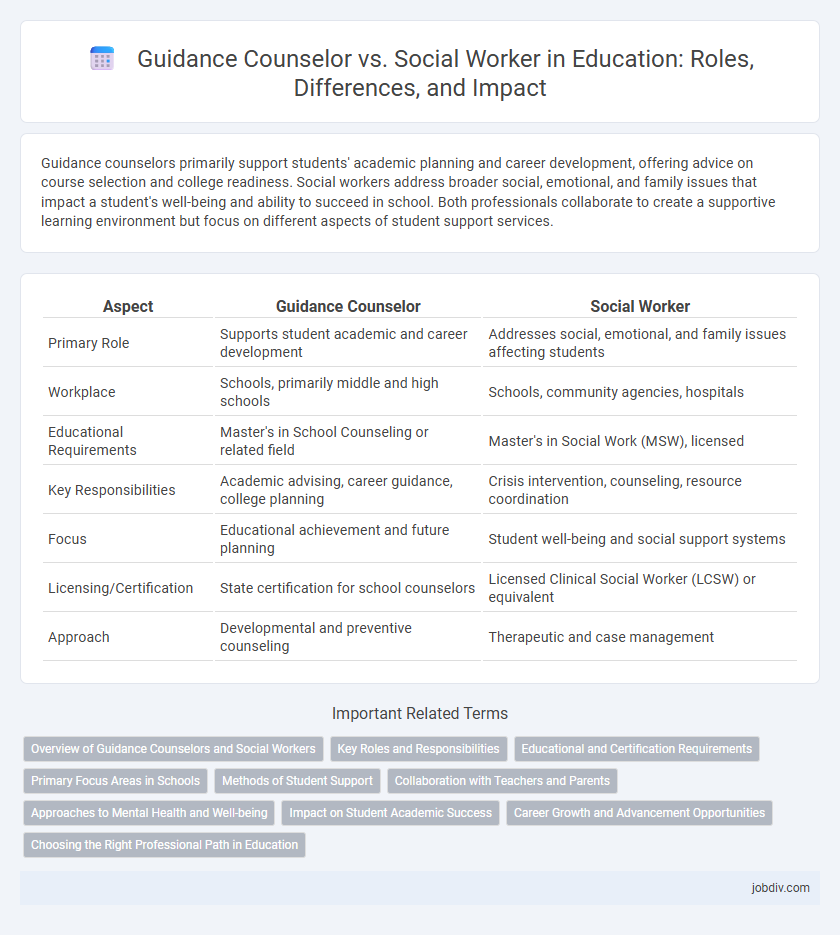Guidance counselors primarily support students' academic planning and career development, offering advice on course selection and college readiness. Social workers address broader social, emotional, and family issues that impact a student's well-being and ability to succeed in school. Both professionals collaborate to create a supportive learning environment but focus on different aspects of student support services.
Table of Comparison
| Aspect | Guidance Counselor | Social Worker |
|---|---|---|
| Primary Role | Supports student academic and career development | Addresses social, emotional, and family issues affecting students |
| Workplace | Schools, primarily middle and high schools | Schools, community agencies, hospitals |
| Educational Requirements | Master's in School Counseling or related field | Master's in Social Work (MSW), licensed |
| Key Responsibilities | Academic advising, career guidance, college planning | Crisis intervention, counseling, resource coordination |
| Focus | Educational achievement and future planning | Student well-being and social support systems |
| Licensing/Certification | State certification for school counselors | Licensed Clinical Social Worker (LCSW) or equivalent |
| Approach | Developmental and preventive counseling | Therapeutic and case management |
Overview of Guidance Counselors and Social Workers
Guidance counselors specialize in academic planning, career development, and personal growth support for students within educational settings. Social workers address broader social, emotional, and environmental challenges affecting students, often collaborating with families and communities to ensure student well-being. Both professions play critical roles in fostering student success but differ in scope, with guidance counselors focusing primarily on educational and career guidance while social workers emphasize systemic support and mental health interventions.
Key Roles and Responsibilities
Guidance counselors primarily focus on academic advising, career planning, and emotional support within educational settings to help students succeed academically and socially. Social workers address broader psychosocial issues, including family dynamics, mental health, and crisis intervention, often coordinating with external agencies to support students' well-being. Both roles collaborate to create a safe and supportive environment, but guidance counselors emphasize educational outcomes while social workers concentrate on holistic social and emotional welfare.
Educational and Certification Requirements
Guidance counselors typically require a master's degree in school counseling or a related field, along with state certification or licensure to practice in educational settings. Social workers in schools usually hold a degree in social work (BSW or MSW) and must obtain licensure such as the Licensed Clinical Social Worker (LCSW) credential, which may involve supervised clinical experience. Both professionals undergo specialized training to address students' socio-emotional needs but differ in educational focus and certification pathways aligned with their distinct roles.
Primary Focus Areas in Schools
Guidance counselors primarily focus on academic support, career planning, and social-emotional development of students within the school environment. Social workers address broader social and family issues, including mental health, crisis intervention, and connecting students with community resources. Both professionals collaborate to ensure students receive comprehensive support but maintain distinct roles based on their specialized training and objectives.
Methods of Student Support
Guidance counselors primarily utilize academic advising, career planning, and emotional support through one-on-one and group sessions to foster student success. Social workers adopt a holistic approach, addressing mental health, family dynamics, and social challenges by connecting students with community resources and implementing crisis intervention strategies. Both professionals collaborate with educators and families to create individualized support plans enhancing students' overall well-being.
Collaboration with Teachers and Parents
Guidance counselors collaborate closely with teachers to develop academic plans and address students' educational challenges, while social workers focus on supporting students' social and emotional needs by connecting families with community resources. Both professionals engage parents through regular communication and involvement in intervention strategies to ensure a cohesive support system for the student. Effective collaboration among guidance counselors, social workers, teachers, and parents enhances students' overall well-being and academic success.
Approaches to Mental Health and Well-being
Guidance counselors in education primarily focus on academic support and career planning while providing basic mental health interventions to promote student well-being. Social workers adopt a holistic approach, addressing complex emotional, social, and family issues through therapeutic methods and crisis intervention. Both roles collaborate to create supportive school environments but differ in scope and depth of mental health services offered.
Impact on Student Academic Success
Guidance counselors play a critical role in enhancing student academic success by providing personalized academic advising, career exploration, and college readiness support tailored to individual student needs. Social workers contribute by addressing external factors affecting learning, such as family issues, mental health challenges, and socioeconomic barriers, creating a stable environment essential for academic achievement. Both professionals collaborate to ensure comprehensive support, but guidance counselors primarily focus on academic planning, while social workers emphasize emotional and social well-being directly influencing student performance.
Career Growth and Advancement Opportunities
Guidance counselors typically experience career growth through specialization in school counseling or moving into administrative roles such as director of counseling, with opportunities in both K-12 and higher education settings. Social workers advance by obtaining clinical licensure, allowing for independent practice, or by moving into leadership positions in healthcare, child welfare, or community organizations. Both professions offer pathways to leadership but differ in settings and required credentials, influencing long-term career trajectories.
Choosing the Right Professional Path in Education
Guidance counselors specialize in academic advising, career planning, and student personal development within educational settings, focusing on supporting students' educational and vocational goals. Social workers in education address broader social, emotional, and behavioral challenges, connecting students and families with community resources and mental health services to promote overall well-being. Selecting the right professional path depends on whether the emphasis is on educational guidance and career support or on addressing complex social and emotional issues affecting student success.
Guidance Counselor vs Social Worker Infographic

 jobdiv.com
jobdiv.com